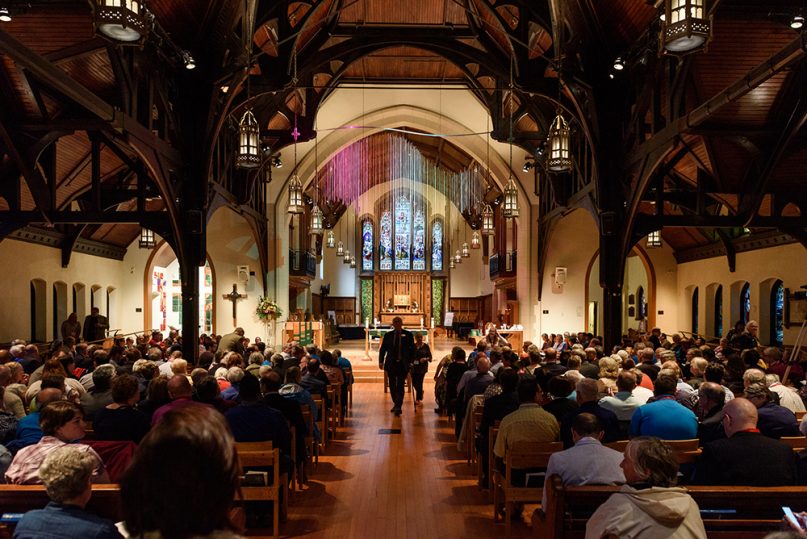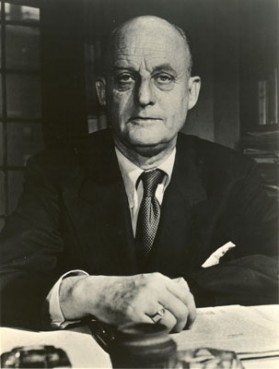(RNS) — In July, the General Synod of the Anglican Church of Canada voted to remove a longstanding prayer from its liturgy that called for the conversion of the Jewish people to Christianity. The deleted wording will be replaced with a new invocation called: “For Reconciliation with the Jews.”
Bishop Bruce Myers warned that persecution of Jews “is not a thing of the past, nor is it restricted to other parts of the world.” He cited last October’s mass shooting at the Tree of Life Synagogue in Pittsburgh, which killed 11 worshippers.
The bishop urged Anglicans “to acknowledge and repent of the church’s participation in anti-Semitism, to stop singling out Jews as a target for our evangelistic efforts, and to assume a humble and reconciliatory stance with our Jewish elders in the faith … Anglicans should … be ever mindful of Christianity’s deep Jewish roots.”
Almost from the beginning of Christianity, members of the new faith believed the Jewish people had lost God’s favor because they “rejected” Jesus, a fellow Jew, as their Messiah and Savior. But, of course, since the early followers of Jesus were Jews, there was no mass “rejection;” no vote was taken, no referendum was held in ancient Israel regarding the claims made about Jesus.

General Synod 2019 opens on the evening of July 10, 2019, with worship at Christ Church Cathedral in downtown Vancouver, British Columbia. Photo courtesy of Anglican Church of Canada/Milos Tosic
However, as the church grew in adherents and influence, Christians came to believe they had won their rightful place as the religious successor to Judaism. The strong belief emerged that it was theologically necessary to convert Jews, the people of Jesus, to Christianity by whatever means necessary. As a result, for the past 2,000 years, Jews and Judaism have existed uneasily alongside Christians and Christianity.
Tragically, throughout that history, church (and often political) authorities frequently employed horrendous physical, emotional and psychological pressures in fruitless conversion campaigns.

Billy Graham speaks at Legion Field in Birmingham, Alabama, in 1964. RNS file photo
The Anglican Church’s recent action joins similar steps taken earlier by major church bodies and prominent Christian leaders alike in a serious and systematic effort to rid Christianity of long-held teachings on conversion. That endeavor includes powerful statements from Popes John Paul II, Benedict XVI and Francis, as well as from two of the most prominent Protestant leaders of the last hundred years: Billy Graham and Reinhold Niebuhr.
In 1973 Graham declared: “I believe God has always had a special relationship with the Jewish people … In my evangelistic efforts, I have never felt called to single out Jews as Jews … Just as Judaism frowns on proselytizing that is coercive, or that seeks to commit men against their will, so do I.”
Fifteen years earlier, Niebuhr was even more blunt: “Christian missionary activity among the Jews … are wrong not only because they are futile … They are wrong because the two faiths despite differences are sufficiently alike for the Jew to find God more easily in terms of his own religious heritage than by subjecting him … to a faith … which must appear as a symbol of an oppressive majority culture … Practically nothing can purify the symbol of Christ as the image of God in the imagination of the Jew from the taint with which ages of Christian oppression in the name of Christ tainted it.”

Reinhold Niebuhr. RNS file photo
In his early writings, Martin Luther hoped that Jews, the kinspeople of Jesus, would convert en masse to Christianity. When that did not happen, the great Protestant reformer mounted a fierce attack on Jews and Judaism. In 1543, Luther wrote “Von den Juden und ihren Lugen,” “On the Jews and Their Lies.”
But in recent years, Lutheran church bodies in both the United States and Europe have publicly faced up to the reformer’s horrific words and officially distanced themselves from Luther. Franklin Sherman, who taught at the Lutheran seminary in Chicago, led the successful campaign to recognize and repudiate Luther’s reprehensible teachings.
Eugene J. Fisher, distinguished professor of theology at Saint Leo University and former head of the Secretariat for Catholic-Jewish Relations for the U.S. Conference of Catholic Bishops, has accurately summed up the current Roman Catholic position on attempts to convert Jews:
The Second Vatican Council declaration, Nostra Aetate … stresses that the covenant between God and the Jewish People, as the Bible states in many places, is “irrevocable.” … Both Jews and Christians are, equally, the People of God. The logical conclusion of this official Church teaching is that Jews do not need to convert to Christianity in order to be saved. They already are saved. Thus, the Church’s approach to Jews cannot be to proselytize or try to convert them. It must be one of dialogue between two Peoples of God who are bound together by a common Bible, the Hebrew Scriptures, and the fact that Jesus lived and died a faithful Jew.
But sometimes it doesn’t require popes, synods, church leaders or Christian denominations to grasp and affirm a profound religious truth. Nearly 400 years ago, Andrew Marvell, a gifted English poet, recognized the futility of trying to convert Jews to Christianity when he composed “To His Coy Mistress,” a brilliant literary attempt to win the love of an unnamed woman.
Marvell well knew his intense efforts at seduction would be lengthy and ultimately fail; just as the long centuries of intense Christian efforts to bring the Jewish people to the baptismal font would not succeed:
Had we but world enough, and time,
This coyness, Lady, were no crime…
I would Love you ten years before the Flood,
And you should, if you please, refuse
Till the conversion of the Jews.
(Rabbi A. James Rudin is the American Jewish Committee’s senior interreligious adviser and the author of “Pillar of Fire: A Biography of Rabbi Stephen S. Wise.” He can be reached at jamesrudin.com. The views expressed in this commentary do not necessarily reflect those of Religion News Service.)
